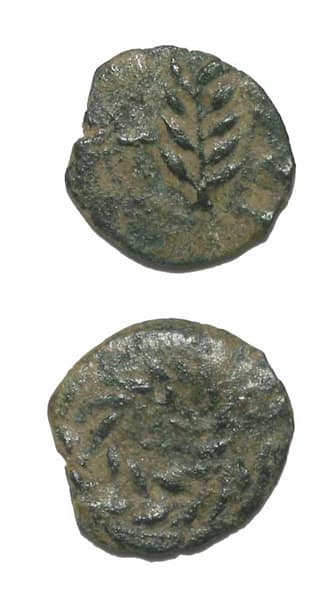Bronze Prutah of the Procurator of Judea Valerius Gratus, 15 CE
Bronze
C.7768
Valerius Gratus served as procurator of Roman occupied Judea from 15-26 A.D. Appointed by Emperor Tiberius, his service, lasting almost a dozen years, was the longest reign of any Roman...
Valerius Gratus served as procurator of Roman occupied Judea from 15-26 A.D. Appointed by Emperor Tiberius, his service, lasting almost a dozen years, was the longest reign of any Roman procurator in Judea. It was during this period that the seeds of growing Jewish unrest were sown, and Jesus worked as an obscure carpenter in Galilee. As the procurator, Valerius was in charge of the religious affairs of his subjects, the Jews, which included appointing the high priests to the Temple. Valerius issued coins during the majority of the duration of his service. His coins, like all those minted by Roman procurators (with the exception of Pontius Pilate), featured no symbols that were utterly abhorrent to the Jews. Two of his favored symbols were the palm branch, a traditional symbol for the abundance of Judea that was also utilized by the Roman for their “Judea Capta” series commemorating the occupation of ancient Israel, and grapes or the grape vine, an important staple of the Judean economy that also had a religious significance as a ritual offering.
How many hands have touched a coin in your pocket or your purse? What eras and lands have the coin traversed on its journey into our possession? As we reach into our pockets to pull out some change, we rarely hesitate to think of who touched the coin before us, or where the coin will venture to after us. More than money, coins are a symbol of the state that struck them, of a specific time and place, whether contemporary currencies or artifacts of a long forgotten empires. This stunning hand-struck coin reveals an expertise of craftsmanship and intricate sculptural details that are often lacking in contemporary machine-made currencies. The struggle of the Jewish people to rule their homeland, as represented by this coin, has finally come to an end in modern times. This coin reconnects us with the past, with those who fought and struggled for their freedom against an oppressive Empire almost two thousand year ago.
How many hands have touched a coin in your pocket or your purse? What eras and lands have the coin traversed on its journey into our possession? As we reach into our pockets to pull out some change, we rarely hesitate to think of who touched the coin before us, or where the coin will venture to after us. More than money, coins are a symbol of the state that struck them, of a specific time and place, whether contemporary currencies or artifacts of a long forgotten empires. This stunning hand-struck coin reveals an expertise of craftsmanship and intricate sculptural details that are often lacking in contemporary machine-made currencies. The struggle of the Jewish people to rule their homeland, as represented by this coin, has finally come to an end in modern times. This coin reconnects us with the past, with those who fought and struggled for their freedom against an oppressive Empire almost two thousand year ago.
